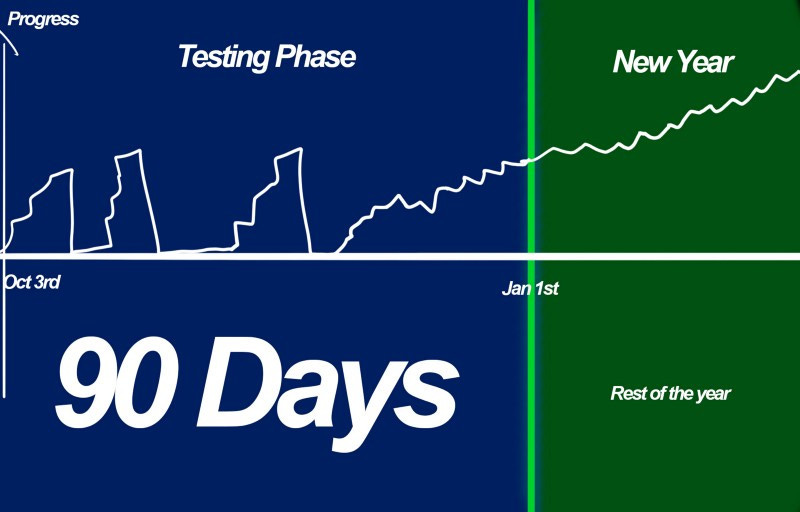90 Days to better New Year’s resolutions
Why I start my New Year’s resolutions on 3rd Oct every year
Every year, as the new year rolls in, millions of people vow that this will be the year they finally get that beach body or read 25 books or save more money.
I know. I was one of them.
Every year I would commit to grandiose goals. I would get pumped up about writing code, making videos or getting a six pack.
And every year I would fail.
I would use all my willpower to push through the first two weeks, sometimes the first two months, but sooner or later I would fail. Life would take over and my goals would go down the drain, leaving me in a pool of anguish and guilt over not being able to follow through.
That changed about 3 years ago. I’m going to discuss how starting on 3rd Oct has been a critical part of it.
But before that…
Why do people fail in achieving their resolutions?
Common reasons include
Lack of willpower
Setting too many goals like wanting to get ripped and learn a new language and a music instrument all at once
Procrastination
Not getting enough time
and so on…
These are fair reasons but I don’t believe people fail in their new year’s resolutions because they don’t put in enough effort, it’s more so because of a flaw in the process of going about it.
The psychological hit of ‘1st Jan — New Year — Clean Slate’ is the first culprit
But starting on the New Year is neither good nor bad and is not the problem. Digging deeper there are two main reasons why starting directly on 1st Jan leads to so many failed New Years Resolutions
Unseen Cascading Effects
Lack of a well-defined process
1) Unknown Cascading Effects and unknown challenges
Any reasonable New Year’s resolution will require you to make changes in your life. If it doesn’t, you’re better off without it. To make these life-altering changes, you will need to put in the effort. This is where the problem comes in, because humans, in general, are bad at estimating how much effort they will need to put in to make these long-lasting changes.
There is almost always a huge gap between the effort you think is required and the effort that is actually required
Most people rely on their willpower to help them make changes in their lives. But once the initial enthusiasm wears off, will-power is not going to carry you to the gym every day.
You can use willpower to get through a few problems, but relying on it consistently will let you down
Why?
Because your goals don’t exist in isolation. The time you carve out to pursue your new goals will have to come from somewhere.
Making changes in one part of your life will have trickle-down effects on other parts of your life. And that will create its own set of challenges.
…which will require you to respond to those challenges. These challenges are in addition to the ones you will encounter depending on the goals you pick. (Eg: coding etc.) Willpower alone can’t handle all of these problems.
Let’s say Joe wants to get ripped this year,
Joe buys new shoes, gym clothes, then gets a full year membership because he reasons that making the down payment will force him to go. On Jan 1st Joe drags his hungover ass to the gym.
Joe pushes himself for the next two weeks. At the end of it instead of feeling better, he’s feeling worse.
He has to wake up 1 hour early to go to the gym → This means he has to go to bed 1 hour early (which usually does not happen)
Two weeks in, he’s tired at work because he’s not getting enough sleep. He’s managed to force himself to hit the gym but he’s not yet managed to get his sleep schedule in place
To make things worse, he’s had to cut back on chilling with the guys. Drinking and eating fatty fast food is usually not something you can do while you’re on a strict diet
This starts to eat at him. He never accounted for the things he would have to give up to be able to go to the gym
Joe decides to take a break for a few days, after all, he’s earned it. Two days turn to 4 and then a week, and then the rest of the year.
Joe wanted to get ripped, but apart from the gym and diet he also had to deal with the physical and emotional consequences his new goal was having on his life
When you make changes, there will be cascading effects which you cannot see at the beginning.
The second reason why starting on 1st Jan is a bad idea is the lack of a clear process.
2) Lack of a well-defined Process
Trying to use willpower to make structural changes in your life, like going to the gym regularly or making time to read for 1 hour a day, is terribly difficult.
It is especially difficult if you don’t know in detail what you have to do.
In the case of Joe, he would have had to clearly define
What time to go to the gym? (Morning / Evening)
How many days in a week?
Workouts for every day?
What happens if you miss a workout?
How many breaks are allowed?
How will he handle the diet aspect? And more...
We are all drowning in decision fatigue. From which TV show to watch on Netflix to which filter to use for our latest Instagram post. Adding more decisions to the mix only worsens things
If prior to starting, Joe manages to have a fixed schedule and a diet plan, he is much more likely to have success. He can probably do this before starting on 1st Jan…
But having a defined process is not enough.
You also need to have the ability to execute consistently on that process. And building that ability takes time
Why does building that ability take time?
Think of how a wild horse is tamed
You don’t tie it up. If you do, the horse becomes more agitated, fighting against the sudden, drastic change.
Instead, you hang a very long rope around the its neck and set the horse free to roam about in the field. Gently, you tighten the rope. Slowly, you keep tightening the rope. The horse, in turn, adjusts to these subtle changes and goes with the flow. Eventually, calming down while you reign it in.
Humans are similar. They fight back at any sudden, drastic changes by trying to maintain the status quo.
And the older we get, the more difficult it becomes to make these long-lasting changes in our lives. Years of life experiences and past baggage slows you down from changing course in an instant. Think of how many times you’ve resolved to do something, but found that you haven’t put in the work on a consistent basis. There is a reason for that. Mark Manson explains it beautifully here.
The case for an Experimental Phase

I learnt concept from Tim Ferris. He runs lots of experiments.
I do the same with my New Year’s goals. I treat the actual New Year i.e 1st Jan as the real deal, but start pursuing goals 3 months earlier.
a.k.a Oct 3rd (90 days before the New Year)
I treat this 3-month period as the testing phase. This is the long rope to my wild horse. In these 3 months, I can experiment and FAIL as much as I want while I explore what it takes to pursue these new goals.
I also use these 3 months to proactively address the two main failures for new goals i.e the Unseen Cascading Effects and the absence of a robust process.
Cascading Effects: The testing phase helps me understand how a new goal will affect the rest of my life and the sacrifices I will have to make to pursue it.
The best part is, if I stop for a week or even a month, there is no pressure of failure. I can always get back in the game a month later and still have 60 days to work through the problems. All of this is practice anyways, till the new year actually starts.
Compare this with falling behind in the actual New Year, when I’m much more likely to give up altogether and start afresh next year.
Building the Process: The testing period also allows me to fine tune my process for pursuing new goals. I experiment with different approaches that I think might work and then I spend the next few weeks testing out that approach.
If it works, great! If not, try a different process . Through deliberate trial and error, I try to perfect the process of pursuing that specific goal before the New Year rolls in.
At the end of three months, I evaluate the effect this has had on my life,. Whether I think it’s worth pursuing this goal further. I do this by measuring the net impact on my life.
Net impact = What you gain — What you give up to attain that gain
We pursue goals for different reasons.
Common among them is the impact these goals will have on our life. You decide on a New Year’s resolution because you believe it will have an overall positive impact on your life.
That may not always be the case.
In the case of Joe, if wanting to get ripped means he’s not able to enjoy a few beers and chicken wings without feeling guilty, does it really make sense for him to put himself through all that pain?
Pursuing goals means paying the price.
Sometimes the price is too high.
Sometimes you are not willing to pay the price
…and that is perfectly fine!
At the end of the day it’s a trade off you make with yourself and you live with it. But you can’t know what the net impact of that goal will be until you actually pursue it and experience what it feels like.
If my new goals have had a net positive impact on my life and I’m putting in the work, I’ll continue. Else, I abandon it and save my time and mind space for other things.
By the time the New Year rolls around, the new goals are no longer ‘new’, ‘massive’ changes that I’m making.
They are simply part of my routine daily life.
If you liked the above post, clap a bit and leave a comment!
Atman is a 26-year old from Mumbai. Currently working as a Strategy Analyst. He loves playing the guitar and the piano and has recently started singing. He maintains a Youtube channel where he covers songs that he loves. Documents his life and his process on Instagram. Follow along @atmanpandya
Cover Photo by Med Badr Chemmaoui on Unsplash



